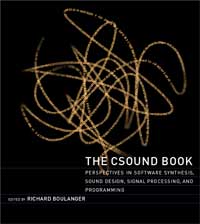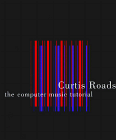MUC4441/6445
Electroacoustic Music Composition/Digital I
Syllabus - Fall 2020 (V.1)
Introduction to direct-digital software synthesis systems through flowcharting, programming, and instrument design focusing on the use of Csound.
Required Texts:
- (available online via numerous vendors)
 | Boulanger, Richard Charles, ed. The Csound Book : Perspectives in Software Synthesis, Sound Design, Signal Processing, and Programming. (MIT Press, 1999). [amazon.com] [barnesandnoble.com] |
E-text Rental directly from MIT Press
[mit press]
Optional Texts:
-
(available online via numerous vendors)
 | Dodge, Charles and Jerse, Thomas. Computer Music: Synthesis, Composition, and Performance.. 2nd ed. (Schirmer Books, 1997). [amazon.com] [barnesandnoble.com] |
 | Roads, Curtis. The Computer Music Tutorial. (MIT Press, 1996). [amazon.com] [barnesandnoble.com] |
Materials Required:
- (1) 32 GB Flash Drive (for data backup)
- 20% Tutorials/Reading
20% Research Paper
15% Listening Reports
15% Mid-Term/Written and Practical
30% Final Project
Office: Office 221/Lab 147/Studio 340/Lair 231
Office Phone No.: 273-3176
Office Hours: see schedule
Professor: Dr. James Paul Sain [email]
Studio/Lab Assistants: Hooman Rafraf [email] & Chris Shelton [email]
Listserv (closed): ufemu-l@lists.ufl.edu
Policies:
1) All listening selections are from the AFA Library Listening Area; please plan your time accordingly. A lack of planning on your part does not necessarily constitute an emergency on the part of the library support staff.
2) Late work is not accepted.
3) Attendance is required at all classes. Should a class be missed, it is the student's responsibility to see that the lecture notes from the missed class are obtained from a classmate and any work assigned is completed by their return (a class list will be supplied to help facilitate this policy). After three (3) class absences your grade will be lowered one grade increment for each absence after three (ie A to A-, or C to C-). Your grade will be lowered one grade increment for each UnBalanced Connection concert missed. Each missed concert or presentation will also result in a reduction in your grade by one increment.
4) The Electroacoustic Music Studio is currently unavailable due to the pandemic; All requirements of this course should be accomplished with personal resources (freeware is available as well as options for minimal cost).
5) Plan early for your final project...things have a way of happening at the last minute.
6) The requirements, emphasis, and timing of this course may be changed or adjusted to meet the specific needs of the class as determined by the instructor.
7) All students of The University of Florida are expected to conduct themselves in a reasonable and professional manner at all times as described in the Student Honor Code; please refer to The Code for specifics.
8) UF Software Copyright Policy: All faculty, staff and students of the University of Florida are required and expected to obey the laws and legal agreements governing software use. Failure to do so can lead to monetary damages and/or criminal penalties for the individual violator. Because such violations are also against the University policies and rules, disciplinary action will be taken as appropriate.
9) UF Counseling Services - Resources are available on-campus for students having personal problems or lacking clear career and academic goals which interfere with their academic performance.
These resources include:
a. University Counseling Center, 301 Peabody Hall, 392-1575, personal and career counseling;
b. Student Mental Health, Student Health Care Center, 392-1171, personal counseling;
c. Sexual Assault Recovery Services (SARS), Student Health Care Center, 392-1161, sexual assault counseling;
d. Career Resource Center, Reitz Union, 392-1601, career development assistance and counseling;
e. University Police Department 352-392-1111 (or 9-1-1 for emergencies).
10) Students requesting classroom accommodation must first register with the Dean of Students Office in Peabody Hall. The Dean of Students Office will provide documentation to the student who must then provide this documentation to the Instructor when requesting accommodation.
a. Disability Resource Center 352-392-8565.
11) Students are expected to provide professional and respectful feedback on the quality of instruction in this course by completing course evaluations online via GatorEvals. Guidance on how to give feedback in a professional and respectful manner is available at gatorevals.aa.ufl.edu/students/. Students will be notified when the evaluation period opens, and can complete evaluations through the email they receive from GatorEvals, in their Canvas course menu under GatorEvals, or viaufl.bluera.com/ufl/. Summaries of course evaluation results are available to students atgatorevals.aa.ufl.edu/public-results/
12) My virtual office door is always open; please feel free to send me an email so that we can discuss class issues as the need arises.
| A | 100-94% |
| A- | 93-90% |
| B+ | 89-87% |
| B | 86-83% |
| B- | 82-80% |
| C+ | 79-77% |
| C | 76-73% |
| C- | 72-70% |
| D+ | 69-67% |
| D | 66-63% |
| D- | 62-60% |
| E | 59-0% |
Week 1 (31 Aug)
- GETTING STARTED: what the heck is a .sco and .orc Boulanger:
- Intro to Sound Design in Csound (pp 5-6)
Orch File and Syntax (pp 7-8)
Sound Design Etude 1 (p 9)
GEN Routines (pp 10-11)
Score Syntax (pp 12-13)
Note Lists and P-Fields (p 14)
Exercises for Etude 1 (p 15)
- 1. Fundamentals of Computer Music (pp 1-24)
2. Acoustics and Psychoacoustics of Music (pp 25-61)
3. Fundamentals of Digital Audio (pp 62-71)
Week 2 (7 Sept, Labor Day - No Classes; Sept. 9)
- ADDITIVE SYNTHESIS: harmonic and inharmonic partial structures Boulanger:
- Theory: Sound, Signals & Sampling (p 16)
Sound Design Etude 2 (pp 18-20)
Exercises for Etude 2 (p 20-21)
- 4. Synthesis Fundamentals (pp 72-114)
Week 3 (14 Sept)
- Boulanger:
- Amplitues & Clipping (p 21)
Data Rates (p 22)
Variable Names (p 23)
Theory: Aliasing & Sampling Theory (p 24)
Sound Design Etude 3 (pp 25-28)
Envelopes (p 29-30)
Theory: Unipolar & Bipolar Functions (p 31)
Exercises for Etude 3 (p 32)
Declare Research Paper Topic
Week 4 (21 Sept)
- SUBTRACTIVE SYNTHESIS: periodic and aperiodic sources
- Boulanger:
- Sound Design Etude 4 (p 33)
Self Comment Instrument Design (p 34)
Spectral Fusion (pp 34-37)
Value Converters (p 38)
Exercises for Etude 4 (pp 39-41)
Listening Report 1
Week 5 (28 Sept)
- Boulanger:
- Theory: Filter Basics (p 42)
Sound Design Etude 5 (p 42)
Cascade Filter Network (pp 42-45)
Displays (p 45)
Echo-Resonator (pp 46-50)
Week 6 (5 Oct)
- SPEECH SYNTHESIS: vowel production/vocal tract modeling Boulanger:
- Score Statements & Note List Shortcuts (pp 50-55)
Exercises for Etude 5 (pp 55-56)
Global Variables (p 57)
Sound Design Etude 6 (pp 58-62)
Conclusion (pp 62-63)
Week 7 (12 Oct)
- DISTORTION SYNTHESIS: FREQUENCY MODULATION
- Boulanger: Understanding and Using GENs - Nelson (pp 65-97)
Dodge: 5.1 Synthesis Using Distortion Techniques (pp 115-138)
MID-TERM EXAM:
Written (take home)Week 8 (19 Oct)
- Boulanger: FM Synthesis and Morping in Csound - Evans (pp 197-206)
Fri 16 Oct UnBalanced Connection 56, MUB 101 at 7:30 p.m.
Week 9 (26 Oct)
- DISTORTION SYNTHESIS: Waveshaping Dodge: 5.2 Synthesis Using Distortion Techniques (pp 139-157)
Declare Final Project with written outline
Listening Report 2
Week 10 (2 Nov)
- DELAY, REVERBERATION Boulanger: Reverb Design - Lyon (pp 467-482)
Dodge: 10.1 Reverberation (pp 289-307)
Week 11 (9 Nov; 11 Nov, Veterans Day - No Classes)
- LOCALIZATION & REAL-TIME USEAGE Dodge: 10.2 Auditory Localization (pp 308-321)
Week 12 (16 Nov)
- GRANULATION SYNTHESIS (WAVELET SYNTHESIS) Boulanger: Granular Synthesis IN Csound - Lee (pp 261-280)
Dodge: 8. Granular Synthesis (pp 262-276)
Research Paper Due
Week 13 (No Class - Thanksgiving Holiday)
Week 14 (30 Nov)
- ADDITIONAL CONSIDERATIONS: computer composition, etc. (and,Individual meetings: Final Project) Boulanger: Convolution - Spjut (pp 507-520)
Dodge: 11. Composition with Computers (pp 341-401)
Listening Report 3
Week 15 (9 Dec; Thursday & Friday, Reading Days)
- Review/Presentation of Final Projects
TUTORIALS/READING: Each class will deal with building Csound coding skills as discussed in lectures and through reading of the text. Each student will demonstration their code and the resultant sound/music created as requested by the instructor in class. Throughout the semester there will also be mini-compositions assigned to demonstrate the student's ability to combine topics addressed.
LISTENING REPORTS: A written critique of compositions on each listening list. These typed reports should contain objective prose describing the works on the listening list that demonstrates an understanding of the techniques used to produce the work as well as the aesthetic of the composition.
RESEARCH PAPER: Ten to fifteen (10-15) page report on an approved compositional technique, synthesis or resynthesis technique, signal analysis process, or other related topic; an additional bibliography/discography must be included (not included in the 10-15 page count for the body of the paper). See me for approval. This is worth 15 percent of your final grade!
MID-TERM EXAMINATION: Subjective examination of material and coding exercises.
FINAL PROJECT: Creative work to demonstrate an understanding and application of the principles and aesthetics discussed and experienced during the course of the semester utilizing the software techniques learned in this course. These projects will be retained/archived. Do not hand in your only copy.
SAFETY HINT: Always keep several back-up copies of your work on multiple disks; if you have a personal Macintosh you may wish to keep one copy on your personal hard-drive. Do not use the labs'/studio's hard-drives as personal storage devices. All drives are regularly cleaned of all unauthorized software, files, and documents. Do not reorganize any software on the platforms in the Electroacoustic Music Studio (MUB 340). Please sign in and out each time you use the studio.
HEARING SAFETY: It is very important that the student of electroacoustic music be aware of the listening environment in which they are working. The studio environment can, if used improperly, subject the listeners ears to unhealthy sound pressure levels. For more information and links to web sites about hearing health click here .
- Listening List
- Course Materials
- Online Manuals (HTML accessable on the FEMS site)
HTML Csound Manual Version 4.0 [w/o frames]
Cecilia for MacOS 2.0 Manual
SoundHack Manual Version 0.8
Ceres Manual- Csound Resources
csoundQT 0.9.6
cSounds.com - "everything Csound"
Historic Boulanger "Toots"
Matt Ingalls' csound page (csounds.com)
Robin Whittle's Csound Page

- Additional Resources
- last update 23 August 2020 -
